It has been many years since Cameron Crowe accomplished consecutive mind-blowing success when he wrote and directed 1996's Jerry Maguire and 2000's Almost Famous. However, even with such triumph underneath his belt, his next film Vanilla Sky was met with severe panning from critics and audiences alike. After watching Vanilla Sky I ascertained that Crowe's career was gradually heading downhill and after that film I lost all faith in the man. Needless to say, without any qualms I gave Elizabethtown the dismissive cold shoulder upon theatrical release. Now that I've finally seen the film I can confirm that it is about as bad as I had anticipated, and Crowe's career has undoubtedly sunk to an all-time low.
Successful shoe designer Drew Baylor (Bloom) causes a loss of one billion dollars in his company, and is fired for his mistake as well as being dumped by girlfriend Ellen (Biel). In severe depression and on the verge of suicide, Drew then learns about the sudden death of his father Mitchell who was still residing in Elizabethtown, Kentucky when he suffered a fatal heart attack. Drew is given a whole new perspective on life upon arrival in Elizabethtown with the intention of attending his father's memorial. During his flight to Kentucky he meets quick-witted flight attendant Claire Colburn (Dunst) with whom he gradually falls in love. As his father's dying wishes and funeral plans (including a debate between cremation and burial) are sorted out, Drew's romance with Claire possesses the potentiality to get his life back on track.
Elizabethtown has many strengths; including a myriad of extremely cute moments and some bright humour. Crowe has even filled the movie with worthwhile messages about life. Unfortunately these messages about life are ripe and abundant in many other movies...including films that he has done in the past. The humour is unfortunately buried and exceedingly hard to unearth. Why? Rather simply because the film is boring beyond all comprehension! After the first hour I started losing interest. There is no substance past the first hour. If there is any comedy after this point in the film I didn't spot it. At the end of the day it also seemingly goes on forever!
But I digress to another extensive list of negatives that shamefully detract from the film's overall value. At every point in the film, director Crowe keeps making the film increasingly pretentious and unrealistic. The whole thing is clichéd from the opening few scenes. Even every character is stereotyped. The locals of Kentucky are shown as one-dimensional hicks with absolutely no depth. Then there are the gaping plot holes and anomalies. I mean a billion dollars to launch a new shoe? A widow learning tap-dancing, stand-up comedy, organic cooking and DIY repair in a few weeks? I could go on forever.
At least the cast were a marginal redemption of the otherwise bleak movie. I have never been a fan of Orlando Bloom, nor will I ever become one. It seems he has a knack for starring in cheesy romance flicks ever since his initial success in the Lord of the Rings trilogy. Now he's just doing sappy stuff like Troy, Pirates of the Caribbean, etc. Bloom is at his usual standard here. In this film it sometimes looks like he's acting...now that took a few minutes to sink in. I couldn't believe my eyes!! Dunst is the usual conventional love interest. Her performance is fair. I thought Susan Sarandon was mediocre at best, but her stand-up comedy routine was almost painful.
Overall, Elizabethtown is another weak film from director Cameron Crowe. At the time that this review is being written, Crowe hasn't tackled another project since and he has no plans to. If I ever produced a film like Vanilla Sky, then followed it with this film I would have happily left the film industry.
4.8/10
Another Cameron Crowe misfire!
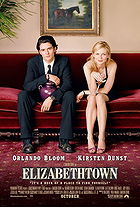 Posted : 16 years, 11 months ago on 6 June 2008 11:20
(A review of Elizabethtown)
Posted : 16 years, 11 months ago on 6 June 2008 11:20
(A review of Elizabethtown) 0 comments, Reply to this entry
0 comments, Reply to this entry
Crude, lewd, hilarious...and touching!
 Posted : 16 years, 11 months ago on 4 June 2008 12:25
(A review of Bad Santa)
Posted : 16 years, 11 months ago on 4 June 2008 12:25
(A review of Bad Santa)
Are you sick and tired of strictly by-the-numbers, saccharine-coated Christmas movies and the dozens of trite annual Hallmark holiday offerings? If so, then praise the skies for director Terry Zwigoff's Bad Santa, a no-holds-barred misanthropic black comedy that casually tears apart every cherished Christmas movie cliché and takes a steaming piss on the remains. Crude, vulgar, crass, and side-splittingly hilarious, 2003's Bad Santa is a gleeful kick in the teeth to all warm, wholesome exhibitions of seasonal greetings. Virtually all well-known Christmas films include a character learning an important lesson, but in Bad Santa, the story involves a boy learning to kick bullies in the balls when they pick on him. How's that for Christmas spirit? To an extent, this is a one-joke film, but it's a rip-cracking one with heart and big belly laughs.

A professional thief, Willie Soke (Billy Bob Thornton) is a hard-drinking, heavy-smoking, no-hoper sexaholic with a cynical, careless attitude towards life. Every year, Willie and his partner, an African American dwarf named Marcus (Tony Cox), pull off the perfect scam. Every year, Willie gets a job as a department store Santa Claus, and once the mall closes on Christmas Eve, they disable the alarms and rob the place, cleaning out the safe of all cash therein. They use the loot to live comfortably throughout the following year before returning to pull off another heist at a different mall in another part of the country. But Willie's excessive drinking problem and uncontrollable impulses threaten to ruin the scam with each passing year, especially when his behaviour gravely offends prudish mall manager Bob Chipeska (John Ritter) after they arrive in Phoenix, Arizona. Unsure that Willie should continue to play Santa, Bob brings the pair to the attention of his security chief, Gin (Bernie Mac). Trouble also ensues when circumstances force Willie to move in with Thurman Merman (Brett Kelly), a dimwitted young boy who has no friends, lives with his senile grandmother (Cloris Leachman ), and believes that the frequently intoxicated Willie is the real Santa. Willie also catches the attention of a bartender named Sue (Lauren Graham), who has a Santa fetish.
Bad Santa did not receive its R rating from the MPAA due to three or four uses of the f-word... The whole movie is crude, foul-mouthed, dirty, disturbing and perverted, containing about 150 uses of "fuck" and its variations, as well as several other profanities, sex scenes and explicit sexual dialogue. These characters make Ebenezer Scrooge look like a pleasant, mild-mannered elderly eccentric. Miramax was the only studio bold enough to green-light the film after Universal Studios outright rejected the script, branding it as "the foulest, disgusting, misogynistic, anti-Christmas, anti-children thing we could imagine." Those in the mood for Christmas cheer should rewatch It's a Wonderful Life because Bad Santa is for the crowd fed up with Christmas carols and artificial goodwill. It may be true that Bad Santa manages a happy ending of sorts, but the film has its tongue firmly in cheek for the final scene of faux optimism. Is the film at all realistic? Fuck, no! It is unbelievable that girls (especially teenagers) find a man as seedy as Willie so sexually attractive, and it takes a healthy suspension of disbelief to accept that no mall managers successfully fire Willie since he continually swears in front of the children. But since when have Christmas movies been realistic?

Some will perceive Bad Santa as mean-spirited and offensive, which is more than justified. But that is a point of praise since Zwigoff and screenwriters Glenn Ficarra and John Requa (their second screenplay after 2001's Cats & Dogs) designed the film to shock. The film shows Willie urinating in his suit in the first five minutes, and the contempt he harbours for the world and everybody around him is almost unsettling. The character is almost beyond redemption: he is foul, misanthropic and downright pathetic, a prick who shows no restraint as he fires off venomous language to child after child without even flinching. But he also hates himself, which is why he lashes out so viciously when pushed. In an absolute desecration of Christmas film convention, the character never undergoes a forced, Scrooge-esque third-act epiphany before becoming kind and wholesome. Similarly, Thurman goes against every "cute movie kid" cliché imaginable: instead of chubby-cute, he is disconcertingly obese and impossibly blank. For most of the movie, the kid relentlessly questions Willie about the North Pole and Mrs. Claus but only receives verbal abuse in response. However, it never appears to register or hurt the child, as his immediate instinct is to offer Willie some sandwiches.
Willie's alcohol-fuelled descent into personal self-destruction is at times hysterical but at other times sad, and it is a testament to Zwigoff's nuanced direction and Thornton's spot-on performance that the character never feels overplayed or contrived. Thornton was born for this role, memorably playing the last guy you would like to see donning Santa's big red suit and sitting in a department store talking to children. According to Thornton, the actor was genuinely inebriated at various points throughout filming, further amplifying his performance and representing a hilarious piece of film trivia. Alongside Thornton, Tony Cox is pitch-perfect as the frequently furious and exasperated Marcus, spouting the vulgar dialogue with utmost power and venom. Meanwhile, young Brett Kelly clearly understands what it takes to portray a dork, and his performance is surprisingly naturalistic. Bernie Mac (R.I.P.) is his usual larger-than-life self as the security chief whose dialogue with the late John Ritter constitutes some of the film's funniest moments. Ritter died shortly after filming, and the movie is dedicated to his memory.

With studios releasing as many extended cuts as possible in the early 2000s for home video exhibition, an unrated edition of Bad Santa emerged on DVD and Blu-ray with an additional seven minutes of footage. However, the studio did not consult Zwigoff while assembling this version, and the filmmaker later oversaw a Director's Cut that actually removes footage and is shorter than the theatrical edition. The unrated edition is the most widely available version of the film, and it is this reviewer's preferred cut, as the added material (most notably a scene in a boxing ring) is hilarious and indispensable.
The biggest success of Bad Santa is the way it delivers line upon line of boundlessly witty, endlessly quotable and hysterically funny dialogue. The movie is a riot from beginning to end, and the replay value is through the roof. Upon viewing the film for the 50th time, it will still cause you to contort in fits of laughter. In fact, you may continue to embrace the movie more and more with each new viewing. Furthermore, Zwigoff infuses Bad Santa with a quality Hollywood continually neglects while producing conventional Christmas romps: heart. Willie does not necessarily become a better person by the end of the story, but his friendship with Thurman is genuinely touching. A perennial Christmas Eve tradition for this reviewer, Bad Santa is the best Christmas film since Christmas Vacation and Die Hard, both of which also provide an alternative to more traditional, upbeat festive viewing.
8.6/10
 0 comments, Reply to this entry
0 comments, Reply to this entry
The first great crocodile flick!
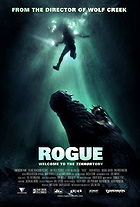 Posted : 16 years, 11 months ago on 3 June 2008 01:25
(A review of Rogue)
Posted : 16 years, 11 months ago on 3 June 2008 01:25
(A review of Rogue)
To the inexpert eye, one might see Rogue as your customary crocodile horror flick in the same league as Lake Placid or Primeval. Hollywood distributors have no shame in releasing a countless amount of monster movies that resulted in being pure rubbish.
Greg McLean stunned audiences in 2005 with the release of his low-budget horror movie Wolf Creek. As I wasn't a fan of McLean's Wolf Creek my expectations had not been raised overwhelmingly high for this film. Rogue sounds like your standard concept of a large man-eating crocodile chowing down on a few people who wander into its lair. But the results are quite the opposite...in fact this is the only decent crocodile horror movie that has ever been released.
Set in the Northern Territory, a cynical American travel writer named Pete McKell (Vartan) is sent on assignment to the Australia outback. Pete joins a bunch of tourists on a river cruise heading out to witness some crocodiles. Pete initially clashes with tour captain Kate Ryan (Mitchell): a spirited woman who simply figures him for a depressing American in search of a cheap thrill. After an uneventful day in the murky river, one of the tourists spots what appears to be a distress flair. Bound by her obligations, Kate is forced to enter unfamiliar waters to investigate. The group are blissfully unaware that they have stumbled into a region occupied by a terrestrial giant man-eating crocodile. With the group stranded on a secluded island with no radio or communication, a fight for survival emerges as enormous crocodile circles below...
The distributors for this movie delayed its release on several occasions. Why? Because 2007 also had FOUR other killer crocodile movies set for release (another being a low-budget Aussie production). By all accounts, McLean's Rogue emerged as the superior film. Although having an extraordinarily low budget for a monster blockbuster, McLean doesn't let a cent of that money go to waste. Unlike most Hollywood croc films, McLean's team actually conducted thorough research into the movements and habits of the saltwater crocodile. The filmmakers utilised an actual rubber crocodile (gorgeously detailed) with some CGI that looks stunning. This may be a low-budget Australian movie, but the special effects are truly astonishing.
The script does contain some predictable scares and clichéd characters; however it's the best screenplay written thus far for a crocodile movie. Firstly, the dialogue is realistic. Secondly, the characters are realistic. Thirdly, about 80% of the genre's clichés have been removed. McLean delicately allows the audience to familiarise themselves with each character as some head towards their imminent doom. The character development is strong and fascinating: there's clever dialogue and interesting personalities. The only flaw is that the characters sometimes suffer from the typical clichés of the genre. We usually know which characters are going to get killed first.
The film's two central characters are played to perfection by Radha Mitchell and Michael Vartan. A special mention must be made about Stephen Curry. Essentially, he's the film's comic relief: your mainstream beer-drinking Aussie who makes funny remarks.
Young director Greg McLean has crafted this movie almost faultlessly. He effectively makes use of everything at his disposal: there are sweeping shots of the gorgeous locations and some intense horror scenes that are skilfully filmed. The score is also a particular stand-out. Whenever a piece of marvellous cinematography is showcased the score suits the atmosphere.
Rogue may be a low-budget Australian movie but it's the definitive croc experience. It's by no means perfect due to a few problems in the screenwriting department, but this is superior to any and all crocodile movies preceding its release. It's suspenseful, chilling and atmospheric. Highly recommended!
7.9/10
 0 comments, Reply to this entry
0 comments, Reply to this entry
Potent anti-war drama
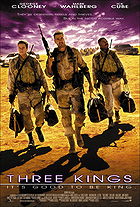 Posted : 16 years, 11 months ago on 3 June 2008 11:54
(A review of Three Kings (1999))
Posted : 16 years, 11 months ago on 3 June 2008 11:54
(A review of Three Kings (1999))
Three Kings is a rare contemporary war film that will satisfy the action junkies in addition to those looking for a more emotional experience. One of the film's most admirable qualities is the absence of drawn out political mumbo jumbo. In its place the filmmakers have opted to focus on the soldiers and their situation in the desert during the first Television War (i.e. the first Gulf War). It's a fitting and triumphant portrait that acts as an absorbing character study containing a commendable balance of drama and action.
Three Kings delivers a potent anti-war message. The film does not begin with the announcement of war, but soldiers celebrating its conclusion before coming to grips with its consequences. The film examines the impact of the media in the warzone: images and propaganda that the gullible American public were fed. With America under the rule of George Bush Snr. there is little wonder why the war suffered from such poor regulations. Just think...this is a man that actually said "I have opinions of my own, strong opinions, but I don't always agree with them". Yes, he truly said that.
Anyway, David O. Russell's Three Kings is a film split into two phases: the first phase is about a group of bored American soldiers planning to steal some gold, with the second phase concerning the American soldiers witnessing the consequences of their decisions and actions. Major Archie Gates (Clooney) is looking forward to his retirement in a couple of weeks as he is disgusted with the war. Troy Barlow (Wahlberg), Chief Elgin (Cube) and Conrad Vig (Jonze) are three bored soldiers under the command of Gates who discover a map detailing the location of stolen gold. Greed getting the better of them, the four plan to venture out into the desert with the intention of stealing the gold for themselves. In theory it's a simple plan, but troubles ensue in its execution. The soldiers soon realise that the war (that they have been told is over) is still deeply in progress with Saddam Hussein's Iraqi soldiers now attacking the civilian population. With the civilians facing slaughter and eradication, the four men rise to the heroic challenge.
Director David O. Russell has created a very different war movie. Russell wanted to make every bullet count and he completes this objective. On that note, the cinematography and editing is outstanding. Early in the movie the character played by George Clooney talks about the effect of a single bullet when it penetrates the body. In so many other combat-oriented war movies we see characters firing off endless amounts of random ammunition. Three Kings makes the audience sincerely comprehend everyone who is shot - even the nameless grunts. There are a few unique images in the film as we see the interior damage of a bullet. Not entirely graphic by any means (seems like something from a simple documentary), but it really hits home. This is a tremendously effective cinematic device. A good creative decision for sure; however it occasionally overwhelms the story. Instead of being immersed in the events, the audience knows that it's a movie.
My interest in Three Kings was originally fired up when I looked at the cast list, with George Clooney, Mark Wahlberg and Ice Cube portraying the central characters. George Clooney rarely, if ever, churns out a faulty product. He hits all the right notes with this film. He proves that he is something much more than just a sex symbol. Mark Wahlberg is deep and engaging in his role. Credit must also go to Ice Cube for his best performance to date. It's a shame that Ice Cube's career soon went down the drain after his sublime performance here. A notable fact is that although the film's title refers to three characters, there are in fact four central protagonists (the fourth being portrayed remarkably by Spike Jonze).
Three Kings is a film with heart and action. Flawed only marginally in its script department, this is a solid film about war and men's actions during war. No gross exaggerations are present.
8.1/10
 0 comments, Reply to this entry
0 comments, Reply to this entry
Wonderful Christmas classic!!!
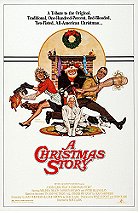 Posted : 16 years, 11 months ago on 2 June 2008 09:46
(A review of A Christmas Story)
Posted : 16 years, 11 months ago on 2 June 2008 09:46
(A review of A Christmas Story)A Christmas Story is one of cinema's most superb Christmas movies: a film that children and parents alike frequently watch towards the end of December each year. All and sundry can recall a Christmas movie that possesses a special place in their heart. A Christmas Story is a heart-warming and charming tale that is commonly held in high regard. This film is for both the children and adults because it's something both generations can relate to. While kids will enjoy the Christmas flavour of this saga, the adults will find a deeper experience due to the nostalgia and realism. For many families and cinema buffs, this is traditional viewing every year when the holiday season kicks in.
A Christmas Story is told in a series of flashbacks as we examine the lead up to Christmas from the perspective of little Ralphie Parker (Billingsley) who lives with his typical suburban middle class family in a small town during the 1940s. The only thing Ralphie wants for Christmas is (as he affectionately describes it) the "Holy Grail of Christmas gifts - The Red Ryder 200-shot, Range Model air rifle". However, Ralphie's mother is not pleased with the choice and does not wish to give her son a BB gun for Christmas in fear he will "shoot his eye out" (a recurring phrase spoken by several characters).
The film is about something much more than just a BB gun. A Christmas Story looks at a young boy's perspective on the world in the lead up to Christmas with the BB gun as a mere centrepiece. The saga is narrated by an older version of Ralphie (Shepard, who also wrote the short stories on which the film is based) whose lines of narration are filled with nostalgia as he reminisces about his childhood. The movie is made up of several short vignettes. Each vignette represents a different aspect of Christmas. Basically everything that one would remember about the holiday season is lovingly recreated: meeting Santa at a department store, the socks you receive as a present but never wanted, and so much more. Of course, a lot of these vignettes represent purely American traditions around Christmas time. Those viewers who do not reside in America (like myself) won't be able to relate to the cold weather, the snow or the craze with BB guns among many other things. This does not affect the film's overall value, but it's worth noting.
The characters are of course played to absolute perfection. Young Peter Billingsley is wonderful: not only is Billingsley adorable and cuddly but the very picture of childhood innocence. The actor was at an extremely young age when the camera started rolling. Although still an infant, his acting skills are definitely above average. Melinda Dillon and Darren McGavin are accurate portraits of your standard parent figures. Ian Petrella is dead-on as Ralphie's younger brother: similar to Billingsley he acts like an average child you'd expect to find looming around a toy store. The whole film is lovingly stitched together with the warm narration from Jean Shepard.
A Christmas Story embodies all the qualities of Christmas season from the perspective of an infant. Christmas time will always be the centre of every child's universe; it's the day of the year every kid waits for. The nostalgia of being a child is perfectly portrayed with this sublime movie. It's corny beyond all belief and sometimes fairly predictable (the only aspect in which the film is flawed), but on the contrary the film is exceedingly heart-warming and brilliant. Never before or since has a movie been able to accurately capture the nostalgic flavour of the Christmas season. For many families it will always be tradition to watch it on Christmas Eve.
8.2/10
 0 comments, Reply to this entry
0 comments, Reply to this entry
Quite disappointing
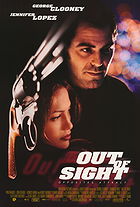 Posted : 16 years, 11 months ago on 1 June 2008 12:21
(A review of Out of Sight)
Posted : 16 years, 11 months ago on 1 June 2008 12:21
(A review of Out of Sight)
After spending the decade of the 1990s in the shadows and remaining overlooked, Steven Soderbergh made his mark in Hollywood with Out of Sight: this sufficiently entertaining crime drama. It's rather a daunting task to categorise a Soderbergh production - this film has elements of romance, comedy, drama, crime and thriller. With these elements in mind, the filmmakers have tossed in a dense, intricate, somewhat fractured screenplay to be implemented by a questionable group of actors. The stage is set for something moderately different to occur.
Jack Foley (Clooney) is a habitual bank robber with a formidable record. Jack decides to shorten his current gaol term by conducting a prison break with the assistance of long-time collaborator Buddy (Rhames). However Jack does not expect to encounter US Marshall Karen Sisco (Lopez) during his prison escape. The pair toy around with an obvious mutual attraction. As Jack and Buddy plan their ultimate scam, Karen is assigned to track them down and bring them to justice. It takes about half an hour to establish that plot. Subsequent to the opening half an hour the plot steadily dissolves with each passing minute. Basically the final 90 minutes of the movie (give or take) are concerned with Karen working to capture Jack and Buddy. However Karen begins having second thoughts about arresting Jack as the mutual attraction intensifies.
Out of Sight is equipped with talent in several departments: acting is generally very good, directing is strong and the screenplay is witty. But director Soderbergh's style will not be liked by all. Quite frankly the film loses its appeal and bogs dreadfully throughout the middle section. The problem with Soderbergh's movies is that, although they're sometimes really unpredictable, it's difficult to assess the importance of each scene. With so little action and so much dialogue there isn't much to sustain interest in the viewer. While watching the movie my eyes were glued to the screen but my mind kept wandering off...I could never remain entirely engaged.
Another fatal flaw is the lack of sizzling chemistry between Clooney and Lopez. George Clooney is always highly charismatic and appears abundantly determined. 60% of Clooney's screen-time features some skilfully-written dialogue and some absorbing drama. It's a shame this level of focus isn't maintained - something solely attributed to the mediocre screenwriting. On the opposite end of the spectrum there's a very questionable Jennifer Lopez. Honestly, I have never liked Lopez's acting so perhaps I am biased. Be that as it may, Lopez is poor at maintaining any degree of intensity. Her lines are occasionally quite witty (sometimes more so than Clooney's dialogue), but she does not do justice to the screenplay. There is zero chemistry between Clooney and Lopez. We have a charismatic performer opposite an actress who really requires a few more acting lessons.
Thankfully the supporting cast are a marginal redeeming feature. Don Cheadle's performance is similar to Clooney's - spirited but let down by the film's unique style. Steve Zahn is always a scene-stealer. It's a shame Zahn is allocated such a minor role. His potentiality could have redeemed this film more emphatically. Michael Keaton's insignificant (uncredited) role is also worth mentioning - a former Batman criminally underused.
Overall, Out of Sight is a mediocre crime film that will not be liked by all. Occasionally there's some great dialogue to absorb and a few strong performances. Not that I was looking exclusively for action, but the drama could have easily been balanced out by more frequent action. I'm glad I watched the film; however I doubt I'll be watching it again any time soon.
 0 comments, Reply to this entry
0 comments, Reply to this entry
A Coen Brothers misfire!
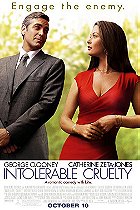 Posted : 16 years, 11 months ago on 1 June 2008 07:36
(A review of Intolerable Cruelty)
Posted : 16 years, 11 months ago on 1 June 2008 07:36
(A review of Intolerable Cruelty)The Coen Brothers established a solid reputation for themselves by exploring (and essentially nailing) a vast assortment of diverse genres. With Intolerable Cruelty the filmmaking duo have yet again explored a different style of film - this production being your standard romantic comedy with themes of divorce and love that are so common in our times. Unfortunately this is among the weakest films that the Coen Brothers have created. Even with innovative ideas and concepts they appear incapable of avoiding the clichés and conventions of the genre.
Miles Massey (Clooney) is a high profile divorce attorney with an indestructible reputation. Miles has everything - a formidable win record, an impressive client list, an ironclad marriage contact named after him and the respect of his peers. For a fee, Miles will gladly twist the facts in favour of his client to assist them in wriggling out of their fiscal responsibilities. Miles' latest client is the outrageously wealthy Rex Rexroth (Herrman) who was caught (on film) being an unfaithful husband. Rex's wife Marylin (Zeta-Jones) elegantly plans to sue Rex, receive a phenomenal alimony, and comfortably enjoy a wealthy independence. There's just one problem: Miles. Owing to his work, Marylin leaves the courtroom with nothing. Not to be outdone, Marylin formulates a scheme to get revenge on Miles. Underhanded strategies, deceptions and an indubitable attraction intensifies as Marylin and Miles square off in a classic battle of the sexes.
Despite being written by a talented duo who rarely produce a faulty product, Intolerable Cruelty is nothing more than your average romantic comedy. After the first 10 minutes it's possible to predict the film's ending. Although running at a brisk 95 minutes, the film is an unnecessarily long trip into clichés and poorly written gags that merely postpone the foreseeable conclusion. The film is destined to leave a Coen admirer both cold and unsatisfied. If you worship the brothers as cinematic messiahs...this film will only taint your image of the pair.
I have no complaints regarding the dazzling bunch of talented actors who got involved in the film. George Clooney's performance is filled with charisma and persuasive verbosity. Clooney is one of the finest actors of the contemporary era. I don't worship the man, but I frequently enjoy his work. This film features a Clooney who completely perfects his role. Catherine Zeta-Jones is luminous as an on-screen partner for George Clooney. As a duo, Clooney and Zeta-Jones work extremely well together and frequently emanate comedic energy. They share some witty lines of dialogue between them that supply some of the film's strongest moments. Also in the supporting cast there's a mediocre Cedric the Entertainer and some minor roles skilfully played by actors like Geoffrey Rush and Billy Bob Thornton.
The film is equipped with a steady supply of quality production values - everything looks bright and attractive with a pleasant atmosphere as an accompaniment for the gorgeous visuals.
Intolerable Cruelty isn't groundbreaking or brilliant like other films created by the talented Coen Brothers. This film can be emphatically added to the limited list of their misfires. It's pleasant enough to keep you mildly entertained for a couple of hours and there are some laughs. Perhaps there are sufficient laughs to keep you entertained but you won't conclude the film with overly positive thoughts in your head. It's dangerously bordering on mediocre and terrible. I guess this is proof that even the most talented bunch of filmmakers can miscarry. All in all, the film's title accurately describes how cruel it truly is to sit through this movie.
 0 comments, Reply to this entry
0 comments, Reply to this entry
An outstanding gangster movie!
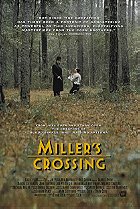 Posted : 16 years, 11 months ago on 31 May 2008 11:29
(A review of Miller's Crossing)
Posted : 16 years, 11 months ago on 31 May 2008 11:29
(A review of Miller's Crossing)
Miller's Crossing is an outstanding gangster drama made prior to the Coen Brothers developing into a massive household name. Even in their early days, the duo consisting of Joel and Ethan Coen could produce movies executed with articulate cinematography, witty dialogue and suspenseful action. It's fascinating that the Coen Brothers were able to successfully nail the gangster genre in one attempt with a screenplay they penned themselves.
Miller's Crossing relies solely on its character development to flesh out the plot. Instead of sincerely delving into the lives of several characters, the film is concerned with one man in particular: Tom Reagan (Byrne). Tom is a wise guy and a loner: acting as a quintessential right-hand man to Prohibition-era Irish mob boss Leo (Finney). The story is a complex plot of intrigue, loyalty and betrayal as it examines the morals within the criminal underworld of the 1930s. The film focuses on two rival gangs that contend for control of the city. Tom's loyalties begin to blur when disputes arise between he and Leo over a girl named Verna (Harden). Inadvertently, Tom is now caught in the middle of a gang war while being posed the question of allegiances. On the surface Miller's Crossing is a mob war film, but underneath it's an exploration of the relationships between a horde of interesting characters, largely from Tom's point of view. Most importantly it is fundamentally an examination of Tom's internal conflicts.
Gabriel Byrne is astonishing as Tom Reagan. Interestingly enough, Byrne's performance reminded me of the classic Bogart performances: a wise-cracking, cool, manipulative and likeable rogue. Byrne is very engaging for those with patience. His performance in this film will always be remembered as one of the genre's finest. Albert Finney is at the top of his game. Similar to the rest of the cast, Finney is absorbing whenever he receives screen time. If anything I believe that Finney was underused; appearing rarely into the second half. Jon Polito is terrifying and menacing as the rival mob boss. Polito nailed his character. Every scene he features in he is nothing short of brilliant. I could not spot any flaws or lapses in his concentration.
The style of the Coen Brothers will not be accepted by all. Many of their creative choices are questionable, albeit unique. The pacing is sometimes extremely slow: an aspect that can be attributed to the way they direct the actors. Similar to every dialogue-orientated gangster film in existence, the filmmakers demand patience. Another unique style of the Coen Brothers is the over-the-top violence and bloodshed. You will frequently witness geysers of blood spurting out from a character that has been shot.
The film also boasts some amazing cinematography. Barry Sonnenfeld's career started as a cinematographer before moving further up the ladder to directing. Sonnenfeld's work cannot be faulted.
Miller's Crossing is one of the definitive films of the Coen Brothers, and marks one of their crowning achievements. The film's single fatal flaw is that it's extremely difficult to get into. It's vital to pay attention to every scene otherwise you'll fall behind and struggle to catch up while missing more of the movie. Naturally, this just means that several screenings are necessary. Overall, Miller's Crossing is extremely an entertaining gangster movie that may not be for all tastes. Do not judge too harshly after your first viewing.
 0 comments, Reply to this entry
0 comments, Reply to this entry
A compelling thriller, despite its shortcomings
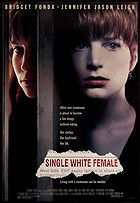 Posted : 16 years, 11 months ago on 31 May 2008 06:20
(A review of Single White Female)
Posted : 16 years, 11 months ago on 31 May 2008 06:20
(A review of Single White Female)An erotic thriller with an unhinged female lead, 1992's Single White Female was released mere months after Poison Ivy, The Hand that Rocks the Cradle and Basic Instinct, all of which tread similar thematic ground. Scripted by television veteran Don Roos (his first feature film credit), the movie is an adaptation of John Lutz's 1990 novel "SWF Seeks Same," and the resulting thriller represents a mostly effective genre exercise thanks to a game cast and a capable director in Iranian filmmaker Barbet Schroeder (Reversal of Fortune, Barfly). Single White Female is a gripping slow-burn, evidently taking inspiration from the likes of Alfred Hitchcock and Ingmar Bergman, but, unfortunately, it is unable to stick the landing, with the third act devolving into clichéd slasher movie silliness.
A fashion software programmer living in New York City, Allie (Bridget Fonda) is left hunting for a new roommate to help with the bills after a tough break-up with her cheating fiancé, Sam (Steven Weber). Allie's newspaper advertisement attracts several unsuitable applicants, but she ostensibly finds the perfect housemate in the meek, kindly Hedy (Jennifer Jason Leigh) who is eager to please, forcefully trying to befriend Allie by giving her gifts. However, Allie is creeped out by Hedy's obsessive behaviour, and a hostile rift emerges when Allie welcomes Sam back into her life, reconciling the broken relationship. With Allie and Sam engaged again, Hedy gets dangerously possessive of her housemate, especially with Allie wanting to live with her fiancé. Things only get creepier when Hedy starts modelling her appearance after Allie, buying the same clothes and even getting the same haircut, with Hedy unwilling to let anybody stand between her and the twin sister she has always wanted.
Although not revolutionary in the genre, Single White Female deserves credit for developing the two lead characters beyond surface-level archetypes, exploring Allie's professional and personal life to make her feel like more than just a bog-standard slasher victim. Furthermore, Hedy is not portrayed as an out-and-out villain; rather, she suffers from borderline personality disorder and has a backstory to explain her increasingly obsessive, violent behaviour. It helps that Fonda and Leigh go for broke both emotionally and physically in their respective roles, exhibiting gravitas and intensity, and the two actresses even bare all on several occasions throughout the film. The supporting cast is fine but unspectacular, with Stephen Tobolowsky (Basic Instinct) making the biggest impression as Allie's sleazy client, while Peter Friedman is believable and likeable as Allie's upstairs neighbour Graham.
Schroeder's sense of mood and atmosphere benefits Single White Female, with the movie at its strongest throughout the first hour or so. Schroeder stages ominous and unsettling beats, finding menace in Hedy's behaviour, and creating suspense as Hedy remains unseen in a dark apartment. With Hedy's behaviour continually escalating, Single White Female goes big in its latter stages, leading to a surprisingly action-packed third act that favours histrionic confrontations over nuance or subtlety. There is a way to execute this premise with a bit more tact and realism, but Schroeder and Roos were evidently aiming for a mainstream thriller, sophistication be damned. At least the set-pieces are competent, while the cinematography by Italian veteran Luciano Tovoli (Dario Argento's Suspiria and Tenebrae) is perhaps more stylish than the material deserves, with careful compositions and terrific use of shadows, while the Manhattan apartment - and, by extension, NYC - becomes a character unto itself. Luckily, the picture encapsulates an authentic sense of time and place, with nothing feeling like it was simply shot on a soundstage. Added to this, Howard Shore's score adds some perceptible menace, nicely complementing the visuals.
A distinctive early 1990s feel permeates Single White Female, particularly with the soundtrack choices as well as the recognisably ancient technology glimpsed throughout. Although by-the-numbers in terms of narrative construction, and even though this is an undeniably silly thriller as the finale approaches, the movie remains an enjoyable, compelling watch despite its flaws, and it's easy to laugh at the more over-the-top moments. It's disappointing that the movie never rises to the same level as a classic Hitchcock or Brian De Palma thriller, but it's certainly not the worst movie of its kind. Those who enjoy suspense thrillers will likely get the most out of it, while those who dislike the genre should probably steer clear.
6.7/10
 0 comments, Reply to this entry
0 comments, Reply to this entry
Utterly predictable and dumb!
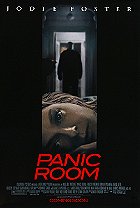 Posted : 16 years, 11 months ago on 30 May 2008 01:55
(A review of Panic Room)
Posted : 16 years, 11 months ago on 30 May 2008 01:55
(A review of Panic Room)
Considering David Fincher's stellar reputation with thrillers, I expected significantly more from Panic Room: a film that turned out to be preposterous, derisorily corny thriller yarn that represents the low point of Fincher's career. (The film is even worse than Alien 3 - now that is saying something!) Fincher is a talented director who brings intense thrills and remarkable camera angles; however the script is inexpressibly appalling.
Recently divorced woman Meg Altman (Foster) is now a single mother living with daughter Sarah (Stewart). Searching for a new home, they decide to purchase an expansive old-fashioned house in New York. To the naked eye it seems like a straightforward house, but it includes the latest state-of-the-art security feature designed for paranoid rich people: a panic room. Panic rooms are impregnable secure rooms intended for refuge during a home invasion. They are made from concrete and steel, therefore impossible to break into. Meg and Sarah become imprisoned in their panic room when a trio of thieves enter the house on the search for a lost fortune. Naturally, said lost fortune is actually inside the panic room which is now impossible to break into. Now it's time for the screenwriter to consult the book of film clichés: screenwriter David Koepp arms this film with every convention and cliché one could possibly comprehend.
The script of Panic Room was inspired by the increasing trend of paranoid people who install "safe houses" for extra security. This film is certainly no commercial for panic rooms; in fact it's quite the opposite. It's a good thing panic rooms aren't as flawed in real life! It seems screenwriter Koepp has no problem with moving from one predictable cliché to the next in quick succession. The whole package has been installed here - stupid thieves with one being reluctant, sick child who needs medical attention outside of the confined panic room, overprotective mother who never does one intelligent thing, etc.
I have no idea how such a dreadful screenplay attracted such a magnificent cast. Jodie Foster's performance is intense and involving. A versatile actress of this stature should never appear in a movie like this. Interestingly enough, Foster voluntarily stepped onto the production when Nicole Kidman had to pull out. Forest Whitaker is another of the generation's finest actors tragically dragged into this mess. Whitaker looks out of place, albeit determined. The rest of the cast are impressive, especially young Kristen Stewart.
Whether director David Fincher is your cup of tea or not, you cannot deny that the man has a good eye for detail. Throughout the movie we have elegant cinematography and meticulously detailed shots executed with excellent special effects. The first half of the movie is suspenseful and effective...as the second half commences you will realise how dreadful the script truly is. There is no intensity anymore and the character development appears to be for nothing. As the film kept dragging on I had hoped that the climax would be the film's saving grace. Instead the climax is the poorest part of the movie.
While I was watching Panic Room I wished that I had a panic room of my own - so I could escape this film! Fincher's stylish directing and the top-notch performances from the cast are the only positive aspects of this film. The script is just too horrible for words. This is your typical fluffy Hollywood thriller: convoluted, silly, stupid, filled with plot holes and...did I mention stupid?
 0 comments, Reply to this entry
0 comments, Reply to this entry
 Login
Login
 Home
Home 183 Lists
183 Lists 1665 Reviews
1665 Reviews Collections
Collections
